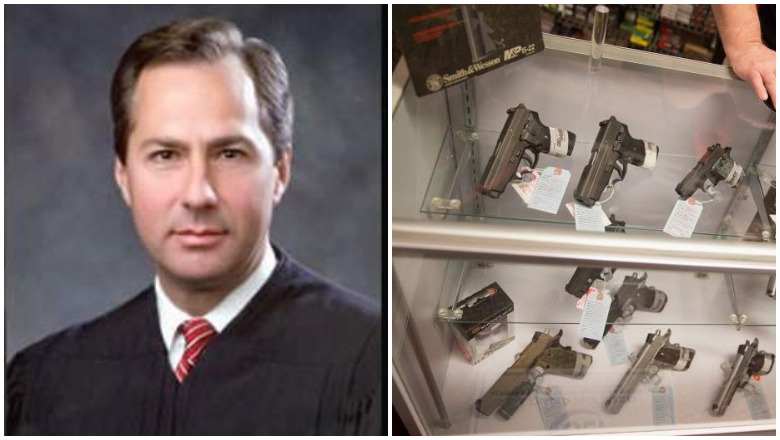
Western District of Pennsylvania/Getty Thomas Hardiman and the Second Amendment
President Donald Trump will be announcing a Supreme Court nominee to replace Justice Anthony Kennedy soon, and Thomas Hardiman is believed to be one of the top people on his list. Of great importance to both liberals and conservatives is what view the new Supreme Court nominee has on gun control and Second Amendment rights. Here is what we know so far about Hardiman’s views on gun control and the Second Amendment.
He’s a Strong Defender of the Second Amendment & Does Not Believe Gun Owners Should Have To Demonstrate Justifiable Need
Hardiman is a strong defender of the Second Amendment, the LA Times reports. For example, he favors the right to carry a gun in public. When the 3rd Circuit, in Drake vs. Filko, upheld a law requiring people who wanted a gun permit to demonstrate “justifiable need,” he wrote a strong dissent. The 3rd Circuit had ruled that yes, the Supreme Court recognized the right to carry a gun to defend your home, but the court didn’t believe the Second Amendment protected the right to carry a gun in public.
In Hardiman’s 40-page dissent, he said that self-defense happens inside and outside the home. He wrote, in part: “New Jersey has decided that fewer handguns legally carried in public means less crime. It is obvious that the justifiable need requirement functions as a rationing system designed to limit the number of handguns carried in New Jersey.”
But He Also Defends Preventing Felons from Having Firearms
As SCOTUS Blog pointed out, Hardiman tends to have an overall originalist approach to the Second Amendment. He wrote that although a felon has a strong interest in defending his home, a felony conviction still disqualifies him from asserting that right in regard to the Second Amendment. “In this regard, the Second Amendment is not unique; felony convictions trigger a number of disabilities, many of which impact fundamental constitutional rights.” He added, “Denying felons the right to possess firearms is entirely consistent with the purpose of the Second Amendment … It is well-established that felons are more likely to commit violent crimes than are other law-abiding citizens.”
However, he has also held that under certain conditions, people might be able to regain their right to bear arms if they are nonviolent, Fox Business reported. In the opinion he wrote that concurred in part, he said that Daniel Binderup and Julio Saurez were permanently barred from possessing firearms because of “prior misdemeanor convictions.” They contended that this was unconstitutional, and he agreed. He wrote: “The most cogent principle that can be drawn from traditional limitations on the right to keep and bear arms is that dangerous persons likely to use firearms for illicit purposes were not understood to be protected by the Second Amendment. And because Binderup and Suarez have demonstrated that their crimes of conviction were nonviolent and that their personal circumstances are distinguishable from those of persons who do not enjoy Second Amendment rights because of their demonstrated proclivity for violence, the judgments of the District Courts must be affirmed.”
He emphasized that “non-dangerous persons convicted of offenses unassociated with violence” might seek their Second Amendment rights to be reinstated. He added that the Second Amendment is a fundamental right that isn’t unlimited, because the scope of the right may be based on questions like “what” (the firearms themselves) or “who” (violent felons vs misdemeanor citizens.)
He wrote: “For instance, the right is ‘not a right to keep and carry any weapon whatsoever in any manner whatsoever and for whatever purpose.’
He later clarified that a felon might challenge a ban on possessing a firearm if he could demonstrate that he was “convicted of a minor, non-violent crime” which renders him no more dangerous than the average citizen or in some cases his crime was decades old and he was no longer a threat to society. But “this does not mean, of course, that a dispossessed individual can win an as-applied challenge by promising to behave well in the future. Courts must diligently inquire into the facts.” He said this would not be easy for a felon to accomplish, but denying even a possibility in all cases was not right.